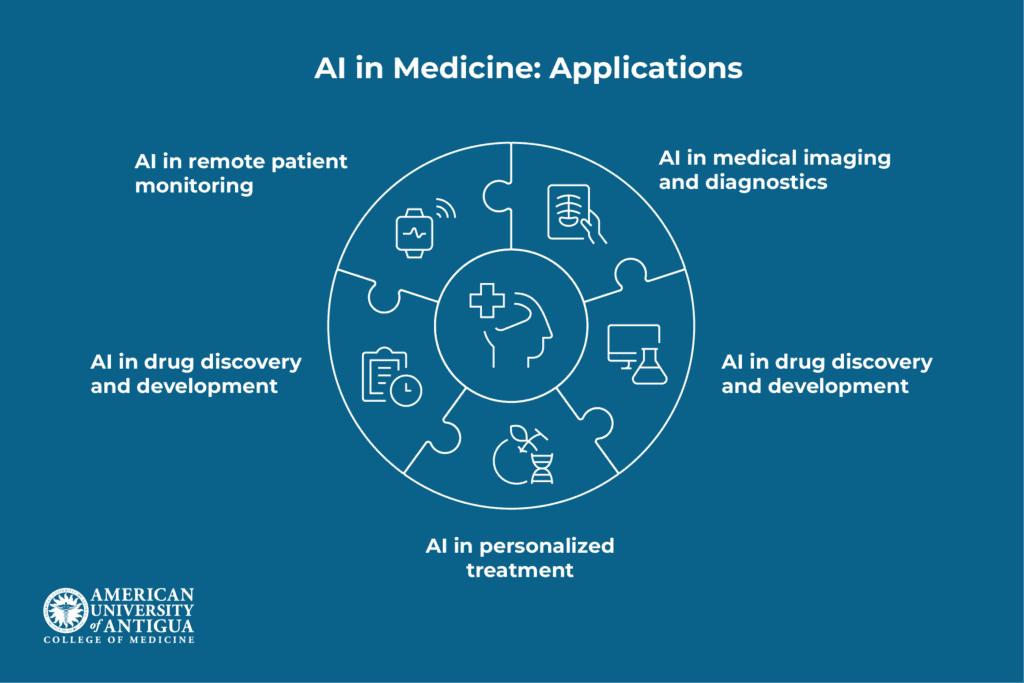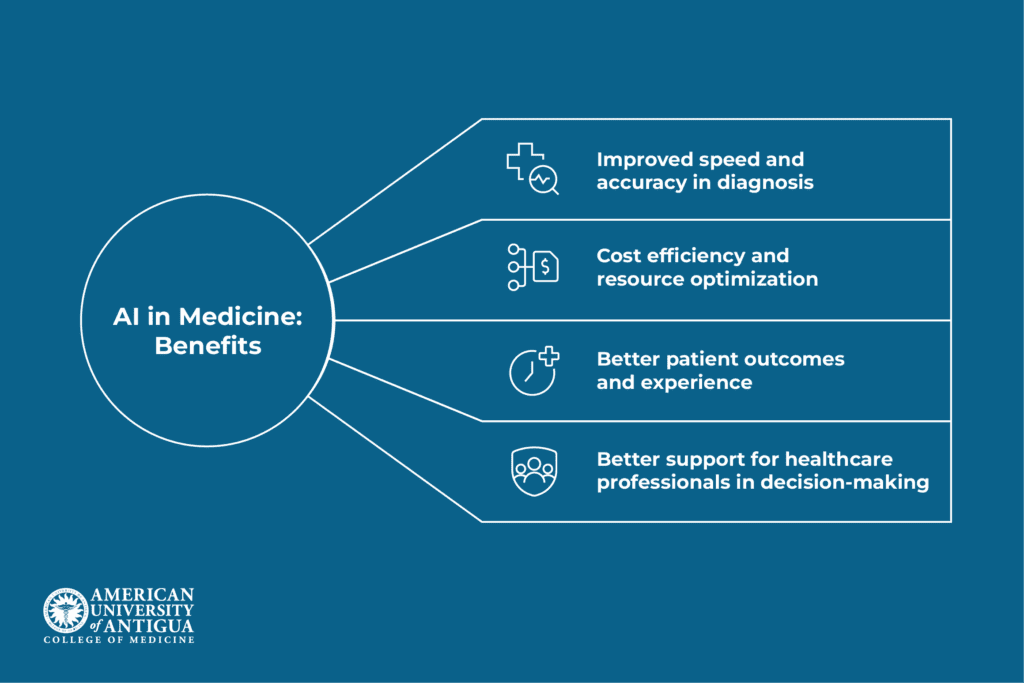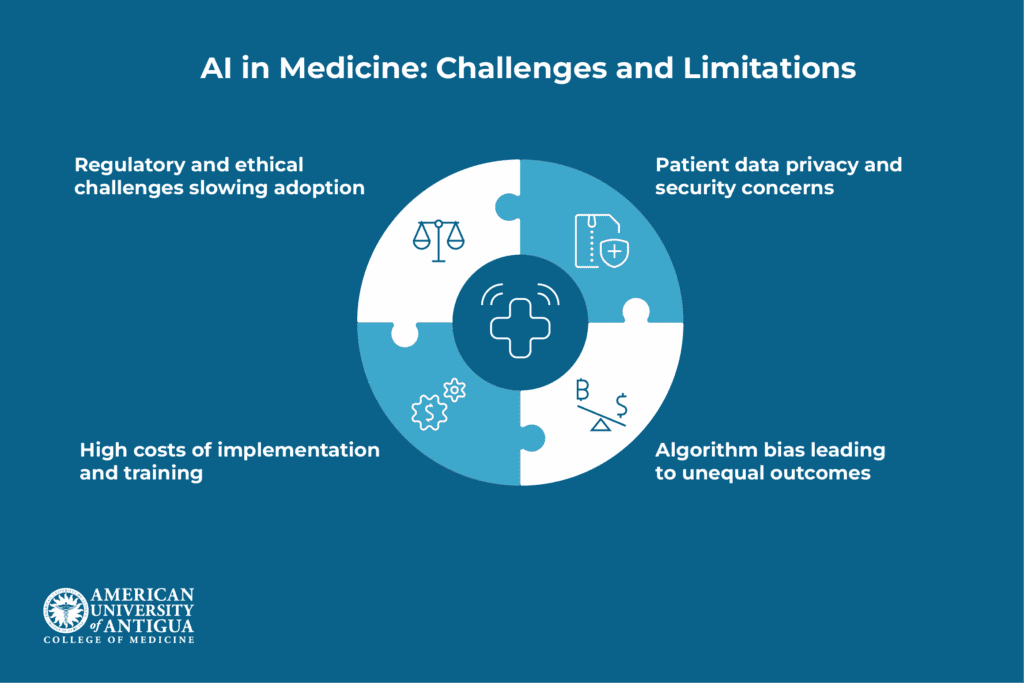AI in Medicine: Uses, Benefits & Challenges
Key Takeaways
- The global AI in healthcare market was valued at approximately $26.57 billion in 2024 and is projected to grow at a compound annual growth rate of 38.5% through 2030.
- A study found that AI systems could detect breast cancer in mammograms with greater accuracy than human radiologists.
- Traditional drug development takes an average of 10-15 years and costs approximately $2.6 billion. AI is changing this by speeding up multiple stages of the process.
- Despite its benefits, concerns about data privacy, bias, costs, and regulation make adopting AI in healthcare challenging for many providers.
Artificial intelligence is changing the practice of medicine in ways that seemed impossible just a decade ago. From detecting diseases earlier than human doctors to creating personalized treatment plans based on a patient’s unique genetic makeup, AI is becoming an essential tool in modern healthcare.
The global AI in healthcare market was valued at approximately $26.57 billion in 2024 and is projected to grow at a compound annual growth rate of 38.5% through 2030. This expansion reflects how quickly hospitals, research institutions, and medical schools are adopting these technologies.
✅ Request information on AUA's MD program TODAY!
For medical students and future physicians, understanding AI’s role in medicine isn’t optional but essential. As AUA faculty recently published in JMIR Medical Education, AI-powered patient simulations are already being used to prepare the next generation of doctors for real-world clinical encounters.
What Is AI in Medicine?
Artificial intelligence in medicine involves using computer-based algorithms and machine learning to complete tasks that usually require human intelligence. These duties include analyzing medical images, predicting patient outcomes, recommending treatments, and managing administrative workflows.
It’s important to understand the distinction between these related terms:
- Artificial intelligence (AI): The broad concept of machines performing tasks that require human-like intelligence
- Machine learning (ML): A field within AI that allows systems to analyze data, learn from it, and enhance their performance over time, instead of relying solely on fixed, pre-written instructions
- Deep learning (DL): A ML subset that uses multi-layered neural networks to recognize and interpret complex patterns
In healthcare settings, these technologies work together to process vast amounts of medical data (from radiologist-reviewed scans to patient records), identifying patterns that humans might miss.
Applications of AI in Medicine

AI’s impact on medicine covers various areas, each addressing specific challenges in patient care and medical practice.
AI in medical imaging and diagnostics
AI has had its strongest influence in medical imaging. Deep learning algorithms can analyze X-rays, MRIs, CT scans, and pathology slides with remarkable accuracy.
A study found that AI systems could detect breast cancer in mammograms with greater accuracy than human radiologists.
In pathology, AI assists in detecting cancerous cells in tissue samples, often identifying early-stage disease that might otherwise be overlooked. This early detection capability can significantly improve patient outcomes by enabling treatment to begin sooner.
AI in drug discovery and development
Traditional drug development takes an average of 10-15 years and costs approximately $2.6 billion. AI is changing this by speeding up multiple stages of the process.
Machine learning algorithms can analyze millions of chemical compounds to identify promising drug candidates in months rather than years. They predict how different molecules will interact with disease targets, reducing the number of compounds that need expensive laboratory testing.
AI also improves clinical trial design by identifying ideal patient populations and predicting which candidates are most likely to respond to treatment.
AI in personalized treatment
One-size-fits-all medicine is becoming outdated. AI enables truly personalized treatment by analyzing individual patient data, including genetics, lifestyle factors, and medical history, to recommend optimal therapies.
In oncology, AI systems analyze tumor genetics to recommend targeted therapies most likely to be effective for each patient. For chronic conditions like diabetes, AI-powered apps adjust treatment recommendations based on continuous glucose monitoring data, physical activity, and dietary patterns.
This approach to personalized medicine connects closely with emerging fields like regenerative medicine, where AI helps identify which stem cell therapies or tissue engineering approaches will work best for individual patients.
AI in administrative tasks
Healthcare professionals spend a lot of time on administrative tasks, and AI is helping automate and simplify them.
Natural language processing algorithms can transcribe and organize clinical notes, automatically code diagnoses for billing, and flag documentation gaps. AI chatbots handle appointment scheduling and answer routine patient questions, freeing staff for more complex interactions.
Insurance claim processing, once slow and heavily manual, can now be mostly automated. AI checks codes, finds errors, and speeds up approvals, cutting wait times from weeks to days.
AI in remote patient monitoring
The rise of telehealth has sped up the use of AI for remote monitoring. Wearable devices equipped with AI algorithms continuously track vital signs, detecting concerning changes before they become medical emergencies.
For patients with heart conditions, AI-enabled devices monitor heart rhythms and alert physicians to irregularities that might indicate atrial fibrillation or other arrhythmias. In diabetes management, continuous glucose monitors paired with AI apps predict blood sugar fluctuations and recommend insulin adjustments.
This constant monitoring enables proactive rather than reactive healthcare, potentially preventing hospitalizations and improving outcomes for patients with chronic diseases.
Benefits of AI in Medicine

Artificial intelligence is transforming healthcare by improving diagnostic accuracy, reducing costs, enhancing patient outcomes, and supporting medical decision-making.
Improved speed and accuracy in diagnosis
AI systems can analyze medical data in seconds, providing preliminary diagnoses that help physicians make faster, more informed decisions. This is particularly valuable in emergency medicine, where every minute counts. AI algorithms can prioritize critical cases, like potential strokes or heart attacks, ensuring patients receive immediate attention.
Cost efficiency and resource optimization
By automating routine tasks and improving diagnostic accuracy, AI reduces healthcare costs significantly. Early disease detection also generates substantial cost savings. Catching cancer at stage one instead of stage three can reduce treatment costs by hundreds of thousands of dollars while dramatically improving survival rates.
Better patient outcomes and experience
AI-powered tools give patients greater control over their health. Mobile apps provide personalized health recommendations, medication reminders, and symptom tracking, all contributing to better adherence to treatment plans.
Predictive analytics help identify patients at risk of complications, enabling preventive interventions. For instance, AI can predict which patients are likely to develop sepsis hours before clinical symptoms appear, allowing earlier treatment.
Better support for healthcare professionals in decision-making
Rather than replacing physicians, AI augments their capabilities. It provides evidence-based treatment recommendations, flags potential drug interactions, and suggests additional tests that might be valuable.
This support is especially helpful for conditions outside a physician’s primary specialty. An AI system can alert a primary care doctor to subtle cardiac findings that would be obvious to a cardiologist, ensuring appropriate referrals.
Challenges and Limitations of AI in Medicine

Despite its benefits, concerns about data privacy, bias, costs, and regulation make adopting AI in healthcare challenging for many providers.
Patient data privacy and security concerns
AI systems need large amounts of sensitive patient data to work well, which raises serious privacy issues. Data breaches affect millions each year, showing how risky it can be to store and share medical information.
Medical ethics require strict adherence to patient confidentiality. As AI systems become more sophisticated, ensuring they comply with regulations like HIPAA while still accessing necessary data becomes increasingly complex.
Patients also worry about who has access to their health information and how it might be used. Building trust requires transparent policies about data usage, strong encryption, and clear consent processes.
Algorithm bias leading to unequal outcomes
AI algorithms learn from historical data, which often reflects existing healthcare disparities.
Algorithm biases occur because algorithms trained on data from predominantly white populations may not perform as well for other groups. If diagnostic AI systems are developed using primarily male patients, they may be less accurate when diagnosing women.
Addressing this requires diverse training datasets, rigorous testing across demographic groups, and ongoing monitoring for disparate outcomes after deployment.
High costs of implementation and training
Implementing AI systems requires substantial upfront investment. Hospitals must purchase software, upgrade IT infrastructure, and train staff to use new tools effectively. Smaller practices and rural hospitals often lack resources for these investments, potentially widening the gap between well-funded and under-resourced healthcare facilities.
Training healthcare professionals to work alongside AI presents another challenge. Medical school curricula must evolve to include skills for doctors working with AI, such as interpreting algorithm outputs and understanding limitations of automated systems.
Regulatory and ethical challenges slowing adoption
Medical AI exists in a regulatory gray area. The FDA has approved over 100 AI-enabled medical devices in 2025, but regulatory frameworks are still catching up with technological advances.
Questions about liability complicate adoption. If an AI system makes an error that harms a patient, who is responsible: the physician who used it, the hospital that deployed it, or the company that created it? These unresolved legal questions make some providers hesitant to adopt AI tools.
Ethical considerations also arise around algorithmic transparency. Many AI systems function as “black boxes,” making accurate predictions without explaining their reasoning. This lack of explainability conflicts with the medical principle of informed consent and physicians’ need to understand their diagnostic tools.
The Future of AI in Healthcare
New tools in robotics, data analysis, and education are helping build a smarter and more connected healthcare system.
Emerging trends in robotics and predictive analytics
Surgical robots enhanced with AI are becoming more sophisticated, enabling minimally invasive procedures with greater precision. These systems can compensate for hand tremors, scale down large movements for microsurgery, and provide surgeons with augmented reality overlays showing critical anatomical structures.
Predictive analytics will play a key role in future healthcare. Instead of treating diseases after they appear, AI will help identify high-risk individuals years earlier, making true prevention possible.
AI’s potential in medical education and training
Medical education is being transformed by AI-powered simulations that provide realistic patient interactions without risk to actual patients. As noted in AUA’s recent publication in JMIR Medical Education, these AI-driven simulations allow students to practice clinical decision-making and patient communication repeatedly until they master these essential skills.
AI tutoring systems will personalize medical education, identifying knowledge gaps and adapting learning materials to each student’s needs. Virtual reality combined with AI will enable students to practice rare procedures before encountering them with real patients.
Vision of fully integrated AI-powered healthcare systems
The future of healthcare lies in the smooth integration of AI across every stage of care. Imagine a system where AI monitors population health data to predict disease outbreaks, coordinates care across multiple providers, personalizes prevention strategies for each individual, and continuously learns from outcomes to improve recommendations.
This vision requires interoperability as different AI systems and electronic health records must communicate effectively. It also demands thoughtful governance to ensure these powerful tools serve patients’ interests rather than purely economic considerations.
Technologies like 3D printing in medicine will integrate with AI to create custom prosthetics, implants, and even bioprinted organs tailored to individual patients’ anatomy and needs.
Wrapping Up
AI is fundamentally changing medicine, offering exceptional opportunities to improve diagnosis, treatment, and patient care. While challenges around privacy, bias, cost, and regulation remain, the potential benefits are too significant to ignore.
For medical students and future physicians, learning how AI works and understanding its limits and ethical implications will be essential skills in the years ahead.
At AUA College of Medicine, we’re preparing students for this AI-enabled future through innovative programs and research initiatives. Our faculty’s groundbreaking work on AI in medical education demonstrates our commitment to staying at the forefront of these developments. If you’re interested in becoming a physician equipped to work with cutting-edge technologies while maintaining the human touch that defines excellent patient care, request information about AUA’s MD program today.
Frequently Asked Questions (FAQs)
How much does AI in medicine cost to implement?
Implementation costs vary widely depending on the system and setting. A basic AI-powered diagnostic tool might cost thousands of dollars for a small practice, while comprehensive AI systems for large hospitals can run into millions of dollars. These costs include software licensing, hardware upgrades, staff training, and ongoing maintenance.
What types of jobs are being created by AI in medicine?
AI is creating new roles, including clinical AI specialists who bridge technology and medicine, AI ethics officers who ensure responsible deployment, medical data scientists who develop and refine algorithms, and AI trainers who teach healthcare professionals to use these tools effectively.
✅ Request information on AUA's MD program TODAY!